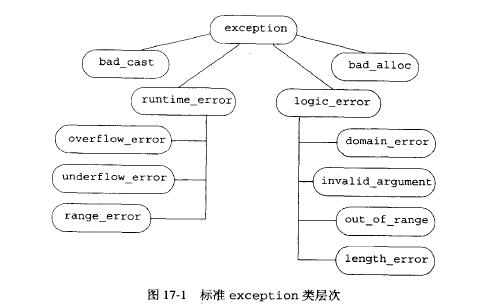C++标准异常类
来源:互联网 发布:手机刷软件 编辑:程序博客网 时间:2024/05/16 04:42
C++标准库异常类继承层次中的根类为exception,其定义在exception头文件中,它是C++标准库所有函数抛出异常的基类,exception的接口定义如下:
namespace std {
class exception {
public:
exception() throw(); //不抛出任何异常
exception(const exception& e) throw();
exception& operator= (const exception& e) throw();
virtual ~exception() throw)();
virtual const char* what() const throw(); //返回异常的描述信息
};
}
除了exception类,C++还提供了一些类,用于报告程序不正常的情况,在这些预定义的类中反映的错误模型中,主要包含逻辑错误和运行时错误两大类。
逻辑错误主要包括invalid_argument, out_of_range, length_error, domain_error。当函数接收到无效的实参,会抛出invaild_argument异常,如果函数接收到超出期望范围的实参,会抛出out_of_range异常,等等。
namespace std {
class logic_error: public exception {
public:
explicit logic_error(const string &what_arg);
};
class invalid_argument: public logic_error {
public:
explicit invalid_argument(const string &what_arg);
};
class out_of_range: public logic_error {
public:
explicit out_of_range(const string &what_arg);
};
class length_error: public logic_error {
public:
explicit length_error(const string &what_arg);
};
class domain_error: public logic_error {
public:
explicit domain_error(const string &what_arg);
};
}
运行时错误由程序域之外的事件引发,只有在运行时才能检测,主要包括range_error, overflow_error, underflow_error。函数可以通过抛出range_eroor报告算术运算中的范围错误,通过抛出overflow_error报告溢出错误。
namespace std {
class runtime_error: public exception {
public:
explicit runtime_error(const string &what_arg);
};
class range_error: public runtime_error {
public:
explicit range_error(const string &what_arg);
};
class overflow_error: public runtime_error {
public:
explicit overflow_error(const string &what_arg);
};
class underflow_error: public runtime_error {
public:
explicit underflow_error(const string &what_arg);
};
}
另外,在new头文件中定义了bad_alloc异常,exception也是bad_alloc的基类,用于报告new操作符不能正确分配内存的情形。当dynamic_cast失败时,程序会抛出bad_cast异常类,其也继承自exception类。

以上均是转载于内容。
下面我附上代码,希望有助于读者理解。
我自己设计的异常类,通过虚函数实现的多态,来动态的确定异常的种类:
#include <iostream>using namespace std;const int DefaultSize = 10;class Array{public:Array(int _size = DefaultSize):Size(_size){if (_size == 0){throw Xzero(_size);}else if (_size < 0){throw XNegative(_size);}else if (_size < 10){throw TooSmall(_size);}else if (_size > 30000){throw TooBig(_size);}pType = new int[_size];for (int i = 0;i < _size;++i){pType[i] = 0;}}class xError{};class ErrorSize{public://异常类的定义ErrorSize(){}ErrorSize(int size):XSize(size){}virtual ~ErrorSize(){}int GetXSize() { return XSize; }virtual void PrintError() = 0;protected:int XSize;};class Xzero:public ErrorSize{public:Xzero(int size):ErrorSize(size){}virtual void PrintError(){cout << "下标不能是 0, " << "size is : " << XSize << endl;}};class XNegative:public ErrorSize{public:XNegative(int size) :ErrorSize(size) {}virtual void PrintError(){cout << "下标不能是负数 :" << "size is : "<< XSize << endl;}};class TooSmall :public ErrorSize {public:TooSmall(int size):ErrorSize(size){}virtual void PrintError(){cout << "下标不能小于10 ," << "size is : " << XSize << endl;}};class TooBig :public ErrorSize {public:TooBig(int size) :ErrorSize(size){}virtual void PrintError(){cout << "下标不能大于30000: " << "size is :"<<XSize << endl;}};public:int GetSize(){return Size;}int& operator[](int offset){int size = GetSize();if (offset<0 || offset>=size ){throw xError();}return pType[offset];}~Array(){delete []pType;}private:int *pType;int Size;};int main(){try {Array arr(0);//Array arr(3000000);//Array arr(6);//Array arr(-1);for (int i = 0;i < 100;i++){arr[i] = i;cout << " a [" << i << "] is ok" << endl;}}catch (Array::ErrorSize& e){e.PrintError();}return 0;}运行结果如下:
- C++标准异常类
- C++标准异常类
- C++标准异常类
- C++ 标准异常类
- C++ 标准异常类
- C++标准异常类
- C++标准异常类
- [C++]详解异常处理(Exception Handling) 及标准库异常处理类
- 标准库的异常类
- C++中的标准异常类
- C++标准库异常类
- 标准异常
- 标准异常
- 标准异常
- C++标准库异常类继承层次
- c++标准异常类的继承实现
- c++学习之标准库异常类
- 标准C++库中的异常类
- 一个用 C 语言写的迷你版 2048 游戏,只有 500个字符
- SQL注入的攻击与防御(简单篇)
- ubuntu苹果主题
- 2015个人书单
- The-Swift-2.0-Programming-Language-playground
- C++标准异常类
- 换网站Logo图片---轻开电子商务系统(企业入门级B2C网站)
- hdu2005 关于输入的技巧及初始化问题
- mysql触发器讲解
- Webservice(基础)——DTD
- 内存和FLASH的区别
- 【Leetcode】Reversed Linked List
- 查找二叉树的操作
- 黑马程序员——Java中类的加载与反射笔记


